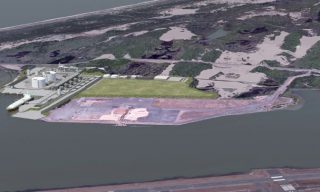The United States Coast Guard has completed a review of the waterway suitability assessment of the Jordan Cove liquefied natural gas (LNG) terminal in Coos Bay.
The assessment was submitted by KSEAS Consulting on behalf of Jordan Cove LNG, USCG said in a statement.
Based upon this review, the captain of the Port Sector Columbia River recommended to the Federal Energy Regulatory Commission (FERC) that the waterway in its current state be considered suitable for LNG marine traffic associated with this project.
The specific measures and the resources needed are documented in a letter of recommendation, USCG submitted to the FERC.
Coast Guard Sector Columbia River staff engaged with the applicant, state and local emergency response providers, as well as port and community stakeholders to assess the safety and security issues associated with LNG tankers traveling into Coos Bay, since receiving of the official notification on January 9, 2017.
“We continue working with local officials and the port community to ensure that every measure is taken to ensure the excellent safety record of the marine transport of LNG is continued if an LNG terminal is built in Coos Bay,” said William Timmons, Coast Guard captain of the Port, Sector Columbia River.
“At this point, the waterway can accommodate the types of vessels associated with the proposed Jordan Cove LNG facility. We are working together to make sure that any resource issues are resolved through the Emergency Response Planning Process,” he said.
The Coast Guard will continue working with the FERC on the development of an environmental impact statement that addresses the effects of the proposed safety and security measures along the waterway.
Once FERC completes their review of an application for an LNG facility it is required to complete an environmental impact statement. The Coast Guard will serve as a cooperating agency for FERC’s EIS.
If the facility is permitted by FERC, Jordan Cove LNG will be required to submit an Emergency Response Plan and Transit Management plans that identify the resources necessary to support the Waterways Suitability Analysis and facility operation.
Pembina Pipeline Corporation, one of Canada’s largest energy infrastructure companies, and Jordan Cove LNG’s parent company is expecting to reach a final investment decision on the project in November this year.
The facility is planned to have a 7.8 million ton per annum LNG production capacity.


